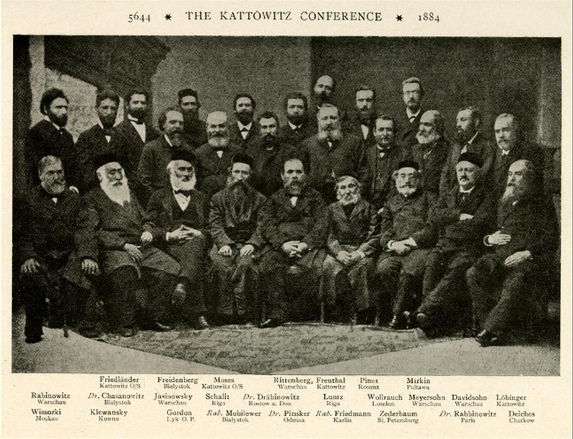First Gathering of the Hovevei Zion Takes Place

November 6, 1884
Delegates convened in Katowice — presently southern Poland — for the first ever gathering of the Hovevei Zion (Lovers of Zion) movement. Beginning in Russia and Romania, Hovevei Zion spread rapidly and gained adherents who would eventually form the nucleus of the modern Zionist movement. Important early members included Chaim Weizmann, Ahad Ha’am, Menachem Ussishkin, Israel Zangwill and Leo Motzkin.
All of the Hovevei Zion societies operated in an independent way and there was virtually no centralization of their efforts to apply the various ideas of how a Jewish territory or state would be ideologically or physically configured. It is particularly noteworthy that from the late 1700s throughout Eastern Europe and later in Western Europe, small Zionist associations and committees formed to debate the need and nature of Jewish nationalism.
In 1882, Leon Pinsker, influenced by a series of riots against the Jews in his hometown of Odessa, published Autoemancipation. In this pamphlet, written in German, Pinsker outlined his belief that the root cause of anti-Semitism was that the Jews were a people without a nation of their own. He called on Jews to organize themselves for the establishment of a Jewish homeland.
Autoemanciaption, despite not specifying that a Jewish homeland should be in the Land of Israel, was met with enthusiasm throughout Russia among the Hovevei Zion, especially as the number of pogroms began to increase in the 1880’s.
As the movement attracted more followers and as small groups began immigrating to the Land of Israel, Pinsker took the initiative to organize a conference of the Hovevei Zion. Originally scheduled for October 27, to mark Moses Montefiore’s 100th birthday (Montefiore was a wealthy British, Jewish philanthropist who had donated large sums of money for land and settlement in the Land of Israel), the meeting was postponed until November 6th because the delegates coming from Russia had difficulty arriving on time.
The conference pledged to support settlement in the Land of Israel and to promote farming, including sending funds to those already settled there.